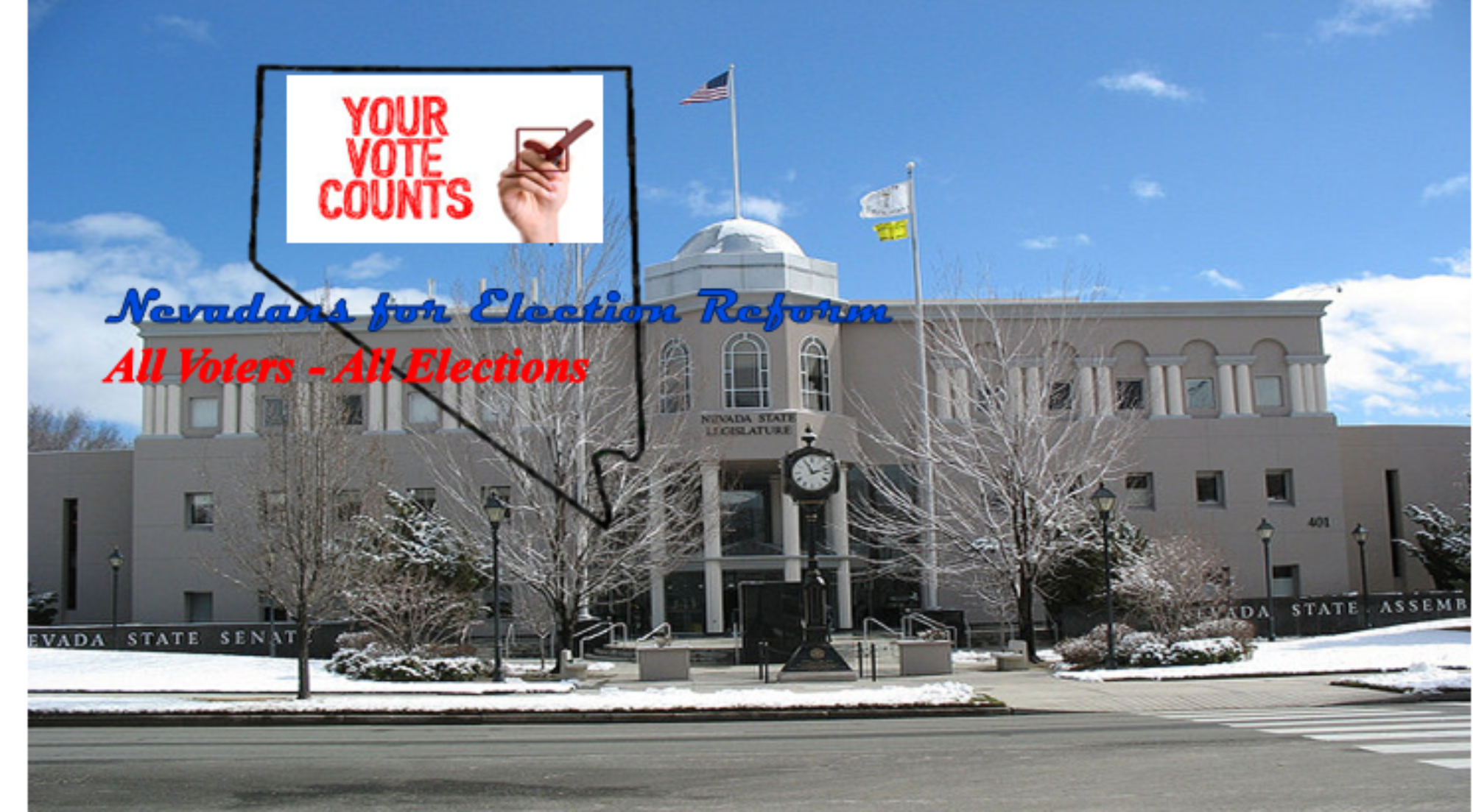By Doug Goodman -Founder & Executive Director Nevadans for Election Reform
On May 23, 2020, in less than ten weeks, voters in Nevada will start casting ballots in the 2020 primary election. Overall, they will be voting in 271 races, deciding between 671 candidates.
Since there are no major state-wide offices on the ballot; U.S. senator, governor, lieutenant governor, secretary of state, attorney general, treasurer, controller, turnout will most likely be less than 20 percent. Very few voters will be selecting the candidates to advance to a high turnout general election or in some cases, deciding the winner of the office. In races with more than three candidates, the winner or winners (where more than one candidate advances) will more than likely advance with a small plurality of the vote with more voters casting ballots for other candidates.
In all elections, Nevada determines the winner(s) using the first past the post (FPTP) method. The candidate with the most votes wins. In races where there are more than two candidates, this can mean the winning candidate(s) receive as low as 20 to 25 percent of the vote. In a low turnout election, this could translate into less than 10 percent of the voters eligible to vote.
The Nevada Democratic Party just used and validated a better way. During the early voting period of the presidential caucus, voters ranked the candidates in order of preference. In a very informal poll, over 90 percent of those responding found the process easy and over 80% liked being able to vote this way. Media has also commented positively on the use of ranked choice voting (RCV) in the caucus.
In addition to allowing voter to express their preference among all candidates in all elections when there are more than two candidates, RCV results in a winner with a majority or at the very least a large plurality of the votes. When more than one winner is required in a given race, RCV provides winners whose vote tally cannot be exceeded by other candidates.
271 races, 671 candidates.
Of the 271 races being contested in the June primaries, 32.1 percent (87 races) will most likely have the winner receiving a small plurality of the votes cast. There will be more votes cast against the winner than for. This is no way for a democracy to work.
Partisan races where RCV would benefit:
CD1 Democratic and Republican primary
CD2 Democratic primary
CD3 Democratic and Republican primary
CD4 Democratic and Republican primary
AD2 Democratic and Republican primary
AD5 Republican primary
AD16 Democratic primary
AD18 Democratic primary
AD31 Republican primary
AD37 Republican primary
AD40 Democratic and Republican primary
Clark County Commission A Democratic primary
Clark County Commission C Democratic primary
Clark County Commission D Democratic primary
Storey County Commission 1Republican primary
Nye County Commission 1 Democratic primary
Nye County Commission 3 Democratic primary
Nonpartisan races where RCV would benefit:
State Board of Education 1
State Board of Education 3
Board of Regents 2
Board of Regents 3
Board of Regents 5
Board of Regents 10
Clark County School District A
Clark County School District B
Clark County School District C
Clark County School District E
Washoe County School District A
Washoe County School District D
Washoe County School District At Large
Churchill County School Board
Nye County School Board VI
Reno City Council 1
Reno City Council 3
Reno City Council 5
Reno City Council At Large
Sparks City Council 1
Sparks City Council 3
Carson City Mayor
Carson Supervisor 2
Carson Supervisor 4
Crescent Valley Town Board
Amargosa Town Board
Incline Village GID
Palomino GID
Gardnerville GID
Indian Hills GID
Round Hill GID
Skyland GID
Topaz GID
Verdi TV District
Moapa Water District Longdale
Moapa Water District Overton
Laughlin Town Board
Tahoe Douglas Fire District
Minden Sanitation
There are also 94 judicial races. Of those 26 have three or more candidates (85 candidates).
There are several ways in which Nevada could implement RCV:
- In any primary contest with more than two candidates with a single winner
- Multi-winner RCV if using top-two, top-three, top-four primary
- In any general election race with more than two candidates including races the result of a top-three or top-four primary
- Give county and city governments to authority to implement RCV by ordinance
- Forego publicly funded primaries and hold only a general election using RCV. This was proposed in our Greater Choice Greater Voice initiative.
- For presidential primaries either winner take all or multi-winner
The 2021 Nevada legislative session can fix the state’s elections making them truly representative of not only the voters of Nevada but also allowing candidates and elected officials to be comfortable in knowing they truly have a mandate of those they represent.

I’m interested in this election ranking system. How can we make it happen here in Las Vegas or Nevada?
Sincerely,
Eddie “MrLasVegas” Hamilton (R-NV01)
Republican congressional candidate for Nevada district-1 in Las Vegas
GoHamiltonGo@gmail.com
(702)752-0016
Eddie,
Thank you for reaching out. Rather than go into a lengthy reply here, I’ll send an email to your gmail account so we can coordinate a phone call.
Doug Goodman